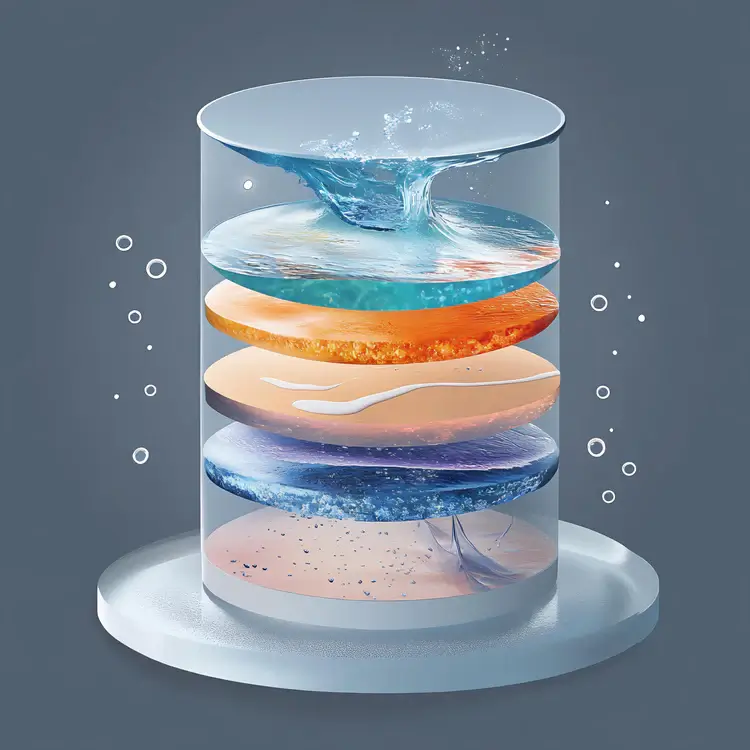Table of Contents
Navigating the array of water filtration options can feel like deciphering a complex puzzle. With various types of water purification systems available, selecting the one that fits your needs involves understanding both your water’s quality and the specifics of each filtration method. Here’s a detailed look at the best water filter system types to guide you through this decision:
Good reads are meant to be shared
Activated Carbon Filters:
- Function: These filters are the workhorses of taste and odor removal, using carbon’s porous structure to absorb impurities like chlorine, pesticides, and other volatile organic compounds (VOCs). They also help in reducing bad tastes and smells, making tap water more palatable.
- Best For: Ideal for homes connected to municipal water supplies where the primary concern is improving the taste and removing chemical by-products from water treatment processes.
Reverse Osmosis (RO) Systems:
- Function: RO systems employ a fine membrane that acts like a sieve, allowing only water molecules to pass through while trapping impurities. This method is effective against a broad spectrum of contaminants including heavy metals, salts, and even some microorganisms.
- Best For: Perfect for regions with hard water or where water contains multiple contaminants. However, they can be less eco-friendly due to water wastage, and you might need to consider a remineralization step to restore beneficial minerals.
Ultrafiltration (UF) Systems:
- Function: Utilizing either hollow fiber or ceramic membranes, ultrafiltration works by size exclusion, effectively removing particles, bacteria, and viruses. It’s like a biological barrier, ensuring your water is free from pathogens.
- Best For: Often used in pre-treatment stages in industrial settings or in homes where pathogen removal is a priority. UF is less effective against dissolved salts or chemicals but excels in clarity and microbial safety.
Ion Exchange Systems:
- Function: These systems are like chemical traders, swapping unwanted ions in your water with more preferable ones. They’re primarily used for softening water by exchanging calcium and magnesium ions with sodium or potassium.
- Best For: Areas with hard water where scale buildup in pipes and appliances is a concern, or where specific heavy metal removal is needed.
Distillation Systems:
- Function: Mimicking nature’s own purification process, distillation boils water into steam, leaving impurities behind, then condenses it back into liquid form. This process is thorough but slow and energy-intensive.
- Best For: When you need water that’s nearly pure for medical, laboratory, or specific industrial uses, though it’s less practical for everyday home use due to its slow pace and high energy consumption.
UV Water Purifiers:
- Function: UV light acts like a silent guardian, damaging the DNA of bacteria, viruses, and protozoa, rendering them harmless. It’s a final touch in many water treatment setups, ensuring no living pathogens remain.
- Best For: As an add-on to existing systems where microbial contamination is a risk, providing an extra layer of safety without altering the water’s taste or chemical composition.
Gravity Filters:
- Function: These are the simplest forms of filtration, relying purely on gravity to force water through a filter medium, often used in basic setups like water pitchers or camp filters.
- Best For: Ideal for emergencies, outdoor activities, or off-grid living where electricity isn’t available. They are cost-effective but limited in contaminant removal compared to more advanced systems.
Considerations:
- Water Quality: Before choosing, have your water tested to see what contaminants are present. This will guide you to the type of water filter system that addresses your specific issues.
- Maintenance: Each system has its maintenance needs, from filter replacements to membrane cleaning, which impacts long-term costs and usability.
- Installation: Consider the space, the complexity of installation, and whether you need a system for a single faucet or the whole house.
- Cost: Balance between the initial investment and ongoing expenses like filter replacements or energy use.

FAQ:
Q1: What’s the simplest and most budget-friendly type of water filter system for home use?
A: Activated carbon pitchers or faucet attachments provide a basic level of filtration for taste and odor improvement.
Q2: Which types of filters in water treatment plant are best for removing bacteria?
A: UV systems or ultrafiltration are highly effective at eliminating bacteria from water supplies.
Q3: Can best water filter types remove all contaminants?
A: No single system can remove all contaminants comprehensively; often, combining different methods ensures broader protection.
Q4: How often should I replace filters in my water system?
A: Filter replacement schedules vary, commonly every 3-6 months for household systems, depending on water usage and quality.
Q5: Is reverse osmosis good for all water types?
A: While excellent for many contaminants, RO systems can be wasteful with water and remove beneficial minerals, necessitating a remineralization step for complete health benefits.
Selecting the appropriate type of water filter system is crucial for ensuring your water is not only safe but also tastes and feels right for daily use. Understanding your water’s profile and weighing the pros and cons of each filtration method will lead you to the most suitable solution for your home or business.
Good reads are meant to be shared




